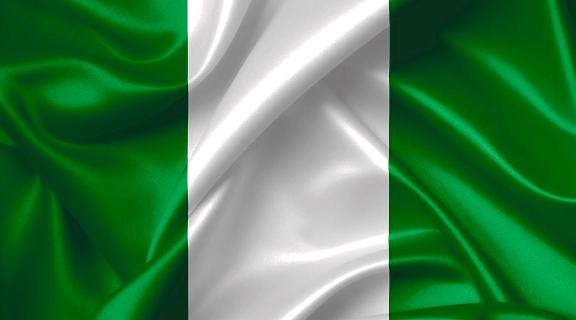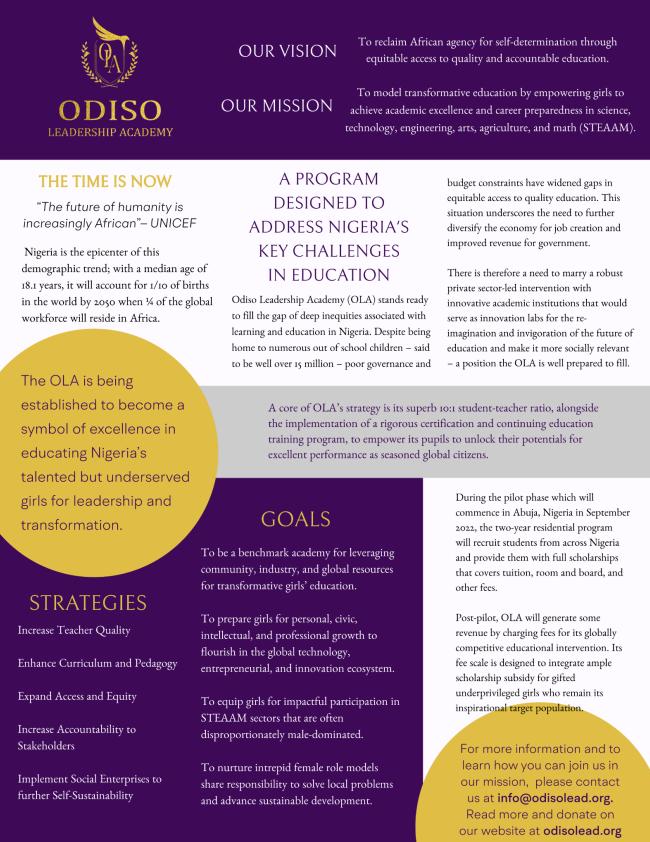
8 minute read
Nigerian By Choice - A Case For The Engagement Of Nigeria?s Foreign-born Diaspora
GraceAmos
BSc.Mechanical EngineeringMIT
NIGERIAN BY CHOICE - A CASE FOR THE ENGAGEMENT OF NIGERIA?S FOREIGN-BORN DIASPORA
Engagement with the Nigerian diaspora has long been identified as a key nation building strategy. With nearly 6%of the GDPmade up of international remittances from the diaspora, both public and private Nigerian initiatives have made several efforts to engage the diaspora in more civic and economic development. Research has shown that most of these remittances are due to familial and social equity, so this income source is most likely limited to those in the diaspora who were originally born in Nigeria, known as the nation-born diaspora.
As emigrated generations progress, nation-of-origin ties inevitably erode. While there isn? t any prediction to determine whether such remittances would decrease over time (the effects of COVID versus the recent CBN initiative aside), there is certainly a growing separation between Nigeria and its diaspora. The foreign-born diaspora, those born abroad to Nigerian parents, will shortly, if they haven't already, outnumber and perhaps out-perform the nation-born diaspora. This is a resource pool that Nigeria should actively considering in the process of creating strategies to expand intentional engagement. Without the pull of family ties, how can Nigeria incentivize the foreign-born to consider themselves as part of this diasporan force?And even if the far-flung foreign-born diaspora were to mobilize at scale, would those at home be willing to include diasporan voices at the table?The answers to these questions are critical, particularly as the foreign-born diaspora are facing the choice whether to claim and intentionally engage with their Nigerian heritage, or turn away.
It was due to the pivotal experience of participating in a Nigerian education startup that I made my choice. Born and raised in the States, I was 18 years old when I first arrived in Nigeria. I was both mute and dumb to my ethnic tongue Yoruba, a fact for which I was often mocked by both family and strangers during my employment as an instructor in Lagos. And yet, despite my Americanized way of life, my accent, and the comforts that I had left behind, I felt an unexpected yet wonderful sense of homecoming. This feeling only deepened as I interacted with the students who came from at least 15 different states across the federation, young people who were so bright and curious and excited for life. Their willingness to learn and their excellent performance in spite of their lack of exposure to the subject matter made me incredibly proud. They helped me see life differently; they helped me see myself differently. For the first time in my life, I was not just born to Nigerian parents, I was Nigerian, and that connection to the land and people of my heritage has lasted long after the program?s completion. Ten years later, I am again involved in an exciting opportunity to return to Nigeria, this time to start an innovative school in Abuja.
Those who are part of Nigeria?s foreign-born diaspora get to choose what it means for them to be Nigerian. Given the challenges associated with Nigeria, it is not hard to imagine that my choice might very well be the minority across the foreign-born diaspora. With little to no immediate family or opportunity back in Nigeria, all we have is what we hear, and what we hear (for those of us who care to listen) is too often discouraging. From the effects of COVID-19 on Nigeria?s social fabric; the rapidly depreciating value of the Naira; the increasing terrorist activity, ethnic and religious violence; and to federal dissatisfaction that includes the response to last year?s #EndSARSmovement, Nigeria does not look like a land of opportunity. For those of us in the West with its increasingly toxic racial divides, being Black is hard enough without adding the social association of being Nigerian in reference to the infamous internet scams.
To tie everything together, many foreign-born diasporans experience difficulty in being accepted as truly Nigerian. Some nation-born diasporans find it hard or outright refuse to acknowledge us who are foreign-born as Nigerian because we more often than not have never been to Nigeria; forget learning our ethnic tongues. With the
cultural barriers between those who have grown up in the diaspora and those who have grown up at home, there grows a divide that is often too wide to cross. Thus isolated from our heritage, there is little incentive to invest in the home of our parents (or grandparents), particularly when compared with the opportunity and expectation of gain to be had from the lands of our birth. After all, many of our parents fled to these lands for the specific purpose of leaving behind the strife and limited resources in Nigeria. Returning or even engaging with ?home?is often seen as foolish, short-sighted, or worse: a slap in the face of those who fought to pave the way for our success in the West.
But some of us foreign-born do choose not only to be Nigerian for reasons that call to us as individuals, but also to invest in Nigeria. There is a growing trend some are calling a ?reverse brain-drain?or ?brain gain,?where those of Nigerian heritage are creating for themselves opportunities by returning to or simply investing in Nigeria, foreign-born and nation-born alike.
The program that I worked with was called Exposure Robotics Academy, and it was started by two MIT students who were both part of the Nigerian diaspora. Even while completing their undergraduate studies, they worked together to communicate their informed vision to industry partners and other stakeholders, creating a driven team that turned the program into a reality. It is those of the diaspora, nation- and foreign-born, with this same visionary impetus who should have access to the necessary resources, beyond convenient familial connections, to bring their innovative and entrepreneurial drive back to Nigeria.
My first engagement with Nigeria nearly ten years ago was an influential introduction to my heritage because I was invited as a valuable part of the team, and I was able to serve on the ground and make my mark as an instructor in the program. I was not home as a visitor, but as a contributor. I was involved in the effort to build something with and in the lives of other Nigerians whom I could call my people. And in turn, I benefited from the experience and was able to leverage the lessons I learned over the course over my subsequent career, and especially now in my current endeavor. Similar opportunities could over time increase the connection that foreign-born diasporans have with Nigeria by giving them the opportunity to be involved in initiatives at home for the good of Nigeria -and themselves. Such initiatives could be supported eventually by government funding, but pilot efforts would have to begin with the private sector. In particular, companies or programs which have the bandwidth could immediately benefit from promoting internships for foreign-born diasporan youth, or perhaps short-term engagements or residencies for academics and professionals. Cultivating such an ecosystem has promising outcomes for the future diversification of Nigeria?s economy and engagement with the diaspora at large, as participants would build not only the confidence to be on the ground, but also the connections and resources to create something new in Nigeria for their own long-term personal and professional gains. This idea is not just speculation. There are efforts by organizations such as Nigerians in Diaspora Organization (NiDCOM) to engage with and recognize the diaspora. Beyond that, a few private initiatives such as MoveMeBack and Youth In Diaspora have worked hard to get a diasporan-involvement ecosystem going for the very reason that they are aware how important it is to create a connection with the foreign-born diaspora in particular. Not just for Nigeria, but also for the foreign-born diaspora who are actively looking for practical ways to find that connection with Nigeria. The initiative I?m working on is an educational organization called Odiso Leadership Academy, which dedicates 5%of our staff positions to help expose foreign-born diasporans to Nigeria. By building on the example of those who have come before us, my hope is that many other companies at home would do the same, creating a vital network and constant flow of energy, ideas, and talent between Nigeria and its diaspora.

It bears repeating that the foreign-born diasporans are very different from the nation-born diasporans, and even more so from Nigerians at home. To this point we are rather sensitive, not only because of the challenges of engagement within the diaspora alone, but also because differences are what mark much of the strife within Nigeria?s borders. But perhaps if Nigeria?s people are more open to accepting the differences across the diaspora, there would be a greater acceptance of the differences within our borders. Such unification across the federation could only influence a brighter future for Nigeria, and a sense of pride that will give those at home and those across the diaspora more reasons to choose to be Nigerian. This would be a fulfillment of the cause we sing together as Nigerians around the world: A rise, O Compatriots N igeria's Call Obey T o serveA rise, our fatherlandO Compatriots W itNh loveigeria'sandCalstrengthl Obey and faith T he labourT o serveof ourour fatherheroes pastland , shall W nevither belove in vaiand stn rength and faith T o serve with heart and T he labour of our her shall never be in vain might, oes past, One N atT o serionve bound inwith heartfreedom, peaceand might, and unity.
One N ation bound in freedom, peace and unity. Grace Amos is a creative with a BSc in mechanical engineering from MIT. She has had an enriching work experience in design, education, strategy, and operations in various entities, including the New York Times, MIT's International Design Center, MITMedia Lab, Facebook, and Western Technology Investments. Her transformative career path has deepened her competence, confidence and courage for problem solving, outreach and engagement. She is currently working on fostering leadership development for talented underprivileged girls in Nigeria through a program architecture that bridges the gap between rigorous academic achievement and entrepreneurial education, called Odiso Leadership Academy (OLA). The mission of OLA is to invest in the development of a dynamic and globally competitive next generation dedicated to harnessing the defining challenges of our time for strategic impact. In her down time she enjoys swimming, dancing, calligraphy, and studying and playing go.











